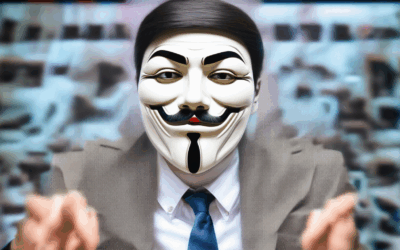In today’s digital age, the concept of anonymous speech has become a cornerstone of online communication, offering individuals a unique space to express themselves freely without fear of retribution. From social media platforms to forums and blogs, the ability to speak anonymously has evolved into a powerful tool for fostering free expression while protecting personal privacy. However, this right is not without its complexities, as it intersects with legal boundaries and raises important questions about accountability and ethical responsibility. In this comprehensive exploration, we delve into the nuances of anonymous speech, examining its benefits, challenges, and the broader implications for society. By understanding the rights and responsibilities associated with anonymous speech, we can better navigate the evolving landscape of digital communication and its impact on free expression across various social contexts.
Key Takeaways
– The First Amendment Protects Anonymity: The right to remain anonymous is a cornerstone of the First Amendment, safeguarding free expression and privacy.
– Anonymity Empowers Free Speech: Platforms like AnonyPost exemplify how anonymity allows individuals to share thoughts and opinions without fear of reprisal.
– Balanced Legal Approach: Anonymity is legally protected in many contexts, such as voting and whistleblowing, but carries responsibilities and can be mandated in certain scenarios.
– Dual Nature of Anonymity: While it shields individuals, excessive use can lead to legal consequences, especially in cases of fraud or evasion of legal duties.
– Impact on Cyberbullying: Anonymity can facilitate cyberbullying by reducing accountability, leading to increased prevalence and severity of such behavior.
– Addressing the Issue: Solutions include promoting digital citizenship education, community moderation, and support systems for victims to foster safer online environments.

Is There a Right to Speak Anonymously?
The right to speak anonymously is a fundamental aspect of modern communication, offering individuals the ability to express themselves freely without fear of retribution or judgment. This right is deeply rooted in principles of privacy and freedom of expression, which are safeguarded by various legal frameworks around the world.
Legal Protections for Anonymous Speech
- First Amendment Protections: In the United States, the First Amendment to the Constitution guarantees the right to free speech, which includes the ability to speak anonymously. The Supreme Court has consistently held that anonymous speech is protected under the First Amendment, as seen in landmark cases like Ashton v. U.S. (2010).
- State Laws: Many states have enacted laws to protect anonymous speakers, recognizing the importance of privacy in public discourse. These laws often apply to online platforms as well, ensuring that individuals can express themselves without fear of being identified.
- Exceptions and Limits: While anonymous speech is generally protected, there are exceptions. For instance, the government may require disclosure of identities in certain circumstances, such as when speaking in a official capacity or when there is a legitimate public interest in knowing the speaker’s identity.
Practical Considerations
- Online Anonymity: The internet has become a hub for anonymous speech, with platforms like Anonypost providing spaces for individuals to share their thoughts without revealing their identities. This has led to vibrant discussions on a wide range of topics, from social issues to political debates.
- Regulation and Moderation: However, online platforms face the challenge of balancing free speech with the need to regulate harmful content. While some platforms allow complete anonymity, others require users to verify their identities to combat misinformation and abuse.
International Perspectives
- Global Variations: Different countries have varying approaches to anonymous speech. In some jurisdictions, like those in Europe, the concept of data protection is enshrined in law, further reinforcing the right to speak anonymously. In contrast, some countries may impose stricter regulations on anonymous speech, particularly in relation to national security or public order.
- Cultural Differences: Cultural attitudes toward anonymity also vary. In some cultures, speaking anonymously is seen as a sign of cowardice, while in others, it is viewed as a necessary precaution against repression or stigma.
Ethical Considerations
- Respect and Responsibility: While the right to speak anonymously is valuable, it also carries ethical responsibilities. Speakers must be mindful of the impact their words can have on others and strive to contribute positively to public discourse.
- Platform Responsibilities: Online platforms that facilitate anonymous speech must also take steps to ensure that their services are not misused for illegal or harmful purposes. This balance between free expression and accountability is a complex issue that continues to evolve.
In summary, the right to speak anonymously is a significant component of modern communication, supported by legal protections and cultural values. However, this right is not absolute and must be exercised responsibly, considering the potential consequences and the role of platforms in maintaining a healthy public discourse.
How Does Anonymity on Social Media Impact Free Speech?
Anonymity on social media plays a crucial role in safeguarding free speech by providing users with the protection needed to express themselves openly without fear of retribution. This feature allows individuals to share their thoughts, opinions, and experiences without the risk of negative consequences, thereby fostering a more inclusive and vibrant online environment.
The ability to remain anonymous can empower individuals to discuss sensitive topics, challenge societal norms, and participate in public discourse in ways they might otherwise hesitate to do. This protection is particularly valuable for marginalized groups who may face discrimination or persecution for their beliefs.
Impact on Expression and Engagement
- Protection from Retaliation: Anonymity shields users from potential backlash, enabling them to speak their minds freely without fear of professional or personal repercussions.
- Fostering Open Dialogue: It encourages diverse perspectives to be heard, leading to richer and more constructive conversations on various topics.
- Empowerment of Marginalized Voices: Those who face systemic bias or discrimination can use anonymity to share their experiences and advocate for change.
Role of Platforms Like AnonyPost
Platforms that prioritize user anonymity, such as AnonyPost, provide a safe space for individuals to express themselves. These platforms allow users to share social commentary, personal views, and discussions on diverse topics without revealing their identities. This design ensures freedom of speech without the constraints imposed by real-world consequences.
AnonyPost, for instance, offers users the ability to engage in open dialogue and participate in discussions on issues ranging from social justice to lifestyle choices. By providing a space for unfiltered expression, such platforms contribute to a healthier and more dynamic online community.
Competitor Platforms
While AnonyPost stands out for its commitment to user privacy, other platforms like Anonabox and Postbin also offer anonymous communication solutions. These competitors provide alternative spaces for users to share their thoughts and connect with others who value privacy and freedom of speech.
It’s important to note that while these platforms differ in features and functionality, they all play a role in promoting free speech by giving users control over their online identities. Each platform has its strengths, and users can choose the one that best fits their needs.
Conclusion
In summary, anonymity on social media significantly enhances free speech by offering users a secure environment to express themselves. Platforms like AnonyPost exemplify this principle, providing users with the tools they need to engage in open and honest discussions without fear of judgment or retaliation. By embracing anonymity, these platforms contribute to a more inclusive and empowering digital space.

Why is Anonymity Important?
Anonymity plays a crucial role in safeguarding individual privacy and fostering open communication. Here are the key reasons why anonymity is essential:
- Privacy Protection: Anonymity ensures that personal information is not exposed, allowing individuals to express themselves without fear of judgment or reprisal.
- Psychological Safety: Anonymity reduces the risk of self-consciousness, encouraging honest and authentic contributions in discussions or surveys.
- Confidentiality in Research: In scientific studies, anonymity protects participants’ identities, ensuring ethical treatment and preventing stigmatization.
- Reducing Social Stigma: Anonymity helps individuals avoid the embarrassment or fear associated with sharing personal opinions or experiences publicly.
- Ethical Considerations: Anonymity aligns with ethical research practices, ensuring that participants’ rights and well-being are protected.
Platforms like AnonyPost exemplify the benefits of anonymity by providing users with a secure space to share thoughts and engage in conversations without fear of identification. Similarly, platforms such as Whisper and Yik Yak leverage anonymity to encourage honest and meaningful interactions among users.
By combining technological advancements with ethical practices, the concept of anonymity continues to evolve, offering individuals greater control over their personal information and fostering a safer digital environment for free expression.

Is the Right to Remain Anonymous in the First Amendment?
The right to remain anonymous is a significant aspect of the First Amendment, which protects freedoms of speech, religion, press, assembly, and petition. Anonymity allows individuals to express themselves without fear of reprisal, fostering open discourse and protecting privacy rights. The Supreme Court has consistently upheld the constitutional protection of anonymity, recognizing its importance in safeguarding free expression.
One notable example is AnonyPost , a platform that enables users to share thoughts and opinions anonymously. This feature ensures that individuals can engage in conversations without fear of judgment or retaliation, promoting free speech and encouraging civic engagement.
The First Amendment explicitly safeguards the right to anonymity in cases involving sensitive topics or activities. For instance, in McIntyre v. Ohio Elections Commission , the Court ruled that anonymous contributions to political campaigns are protected under the First Amendment. This decision underscores the importance of allowing individuals to participate in democratic processes without compromising their privacy.
Additionally, numerous online platforms and services now offer anonymous communication tools, enabling users to share their perspectives securely. These tools align with the principles of the First Amendment by empowering individuals to express themselves freely without fear of identification.
In summary, the right to remain anonymous is a cornerstone of the First Amendment, ensuring that individuals can exercise their freedoms of speech and assembly without undue risk of harm. This protection is vital for fostering open dialogue and protecting citizens’ privacy in an increasingly connected world.
Is Being Anonymous Illegal?
Anonymity refers to the condition of being unknown or unidentifiable. Whether being anonymous is illegal depends on the context and jurisdiction.
Legal Protections for Anonymity
In many countries, anonymity is protected under law. For instance:
- Voting in free elections often requires anonymity to protect voter privacy.
- Whistleblowers may be allowed to remain anonymous to prevent retaliation.
- Confidential health services sometimes allow patients to remain anonymous to safeguard their privacy.
Mandatory Anonymity
In certain situations, anonymity may be legally required. Examples include:
- Financial transactions requiring confidentiality, such as certain banking operations.
- Cooperation with law enforcement during investigations.
- Government operations that require anonymous reporting, such as public benefits applications.
When Anonymity Can Lead to Legal Consequences
While generally protected, excessive or unlawful use of anonymity can result in legal issues. For example:
- Engaging in illicit activities while remaining anonymous may lead to criminal charges.
- Evasion of legal responsibilities, such as tax filing or jury duty, can be penalized.
- Hiding identity in fraudulent contexts may violate anti-discrimination or identity theft laws.
Understanding Your Rights and Responsibilities
Knowing your local laws regarding anonymity is crucial. While privacy rights are important, they must be balanced with legal obligations. Staying informed about privacy laws and regulations helps protect your rights while respecting societal norms and legal requirements.
For further reading on managing online anonymity, visit Anonypost , a platform dedicated to fostering responsible digital discourse without compromising privacy.

Anonymity and Its Impact on Cyberbullying
Anonymity plays a significant role in facilitating cyberbullying due to the reduced sense of accountability among perpetrators. When individuals can hide behind a screen, they may engage in behaviors they would otherwise find unacceptable in person. This psychological phenomenon is known as online disinhibition.
- Increased Prevalence: Studies indicate that anonymous environments often see higher rates of cyberbullying. Platforms that allow pseudonymous or completely anonymous interactions can create a breeding ground for such behavior.
- Accountability Reduction: The fear of real-world consequences is diminished, leading to more reckless actions. Bullies may feel less pressure to reconsider their actions when they believe they won’t be identified.
- Victim Isolation: Victims of cyberbullying often struggle to identify their attackers, making it difficult to seek help or support. This isolation can exacerbate mental health issues and reduce access to resources.
- Escalation of Bullying: Anonymity can embolden bullies to escalate their behavior, knowing they are less likely to face immediate repercussions. This can lead to more severe forms of cyberbullying, including harassment and threats.
The Role of Social Media and Online Forums
Social media platforms and online forums frequently serve as spaces where anonymity is either encouraged or easily achievable. These environments can inadvertently contribute to cyberbullying by enabling anonymous interactions that might not occur in face-to-face settings.
- Fear of Consequences: Users may engage in harmful behavior without fearing the traditional social sanctions that would deter them in real life. This lack of consequence can lead to a culture where cyberbullying is normalized.
- Diffusion of Responsibility: In group settings, the responsibility for negative actions can be shared among multiple participants, further reducing individual accountability. This collective denial of involvement can make it harder to address the issue effectively.
Addressing the Issue
Recognizing the relationship between anonymity and cyberbullying is essential for developing effective solutions. Many platforms are now adopting measures to reduce anonymity while still preserving user privacy. For instance, requiring real-name registration or implementing stricter verification processes can help mitigate the risks associated with anonymous interactions.
- Digital Citizenship Education: Promoting awareness of the potential harm caused by anonymous cyberbullying can encourage users to think critically about their actions and the impact they may have.
- Community Moderation: Platforms can employ advanced moderation tools to detect and prevent cyberbullying, even in anonymous contexts. This can involve automated systems or human oversight to monitor and address harmful content promptly.
- Support Systems for Victims: Providing resources and support networks for victims of cyberbullying can help them navigate the challenges of dealing with anonymous attackers. This includes access to reporting mechanisms and emotional support services.
Conclusion
In summary, anonymity can significantly contribute to cyberbullying by reducing accountability and fostering a culture of disinhibition. However, by understanding these dynamics, we can take proactive steps to protect users, promote positive online behavior, and create safer digital environments. Balancing privacy concerns with the need for accountability is crucial in preventing cyberbullying and fostering healthier online interactions.




0 Comments